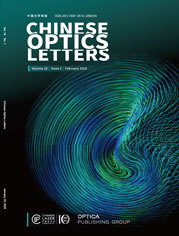Novel method for diagnosis of early-stage lung cancer: using metamaterials THz sensors

Schematic diagram of the experimental setup for early-stage lung cancer diagnosis.

The measured THz frequency-domain (FD) transmission spectra of cancer tissue and normal tissue, respectively
Currently, lung cancer has become one of the leading causes of cancer death. In many cases, the lung cancer has already spread beyond the original site by the time the patients have symptoms and seek medical attention. The main reason is that early-stage lung cancer has no obvious symptoms and is very difficult to be definitely diagnosed by general methods including bronchoscopy, mediastinoscopy, biopsy, etc. Moreover, the general methods are complicated or time consuming. Therefore, rapid diagnosis of early-stage lung cancer is of great significance.
Metamaterials (MMs) are artificial composite materials or structures which composed of sub-wavelength resonance unit cells. They have special physical properties which cannot be found in natural materials. Terahertz (THz) sensors based on the MMs are extremely sensitive to the change of surrounding dielectric. Thus they can find wide applications in biomedicine.
Because the refractive index and absorption coefficient of early-stage lung cancer tissues show very little difference from that of the normal tissues, it is very difficult to diagnose early-stage lung cancer. For the first time in the world (to the best knowledge of the authors), the research group led by Prof. Fangrong Hu from Guilin University of Electronic Technology utilized the THz sensors based on MMs to test and diagnose the early-stage lung cancer under the collaboration with Prof. Huasheng Liang from the Ninth Affiliated Hospital of Guangxi Medical University. The results indicated that the THz frequency spectra showed distinct difference when the sensors were covered with normal tissues and early-stage cancer tissues in the same thickness, and the frequency shift was larger when the sensor was covered with cancer tissues. It could provide important theoretical foundation for the diagnosis of early-stage lung cancer. The related research results have been reported in Chinese Optics Letters, Volume 15, No. 11, 2017 (Xin Xu et al., Metamaterials-based terahertz sensor for quick diagnosis of early lung cancer).
The proposed method can distinguish cancer tissues from normal tissues even though they have very close refractive index and absorption coefficient. Compared with conventional medical methods and other THz methods by calculating the tissues’ refractive index and absorption coefficient, the proposed method is very quick, simple, and label-free.
Prof. Hu, the director of the research group, believes that this method is very promising for the diagnosis of not only lung cancer but also some other cancers in early-stage. It promotes the application of THz technology in biomedicine.
Further work will be focused on the design of novel MMs THz sensors with higher sensitivity, and the application in the diagnosis of other cancers in early-stage.

